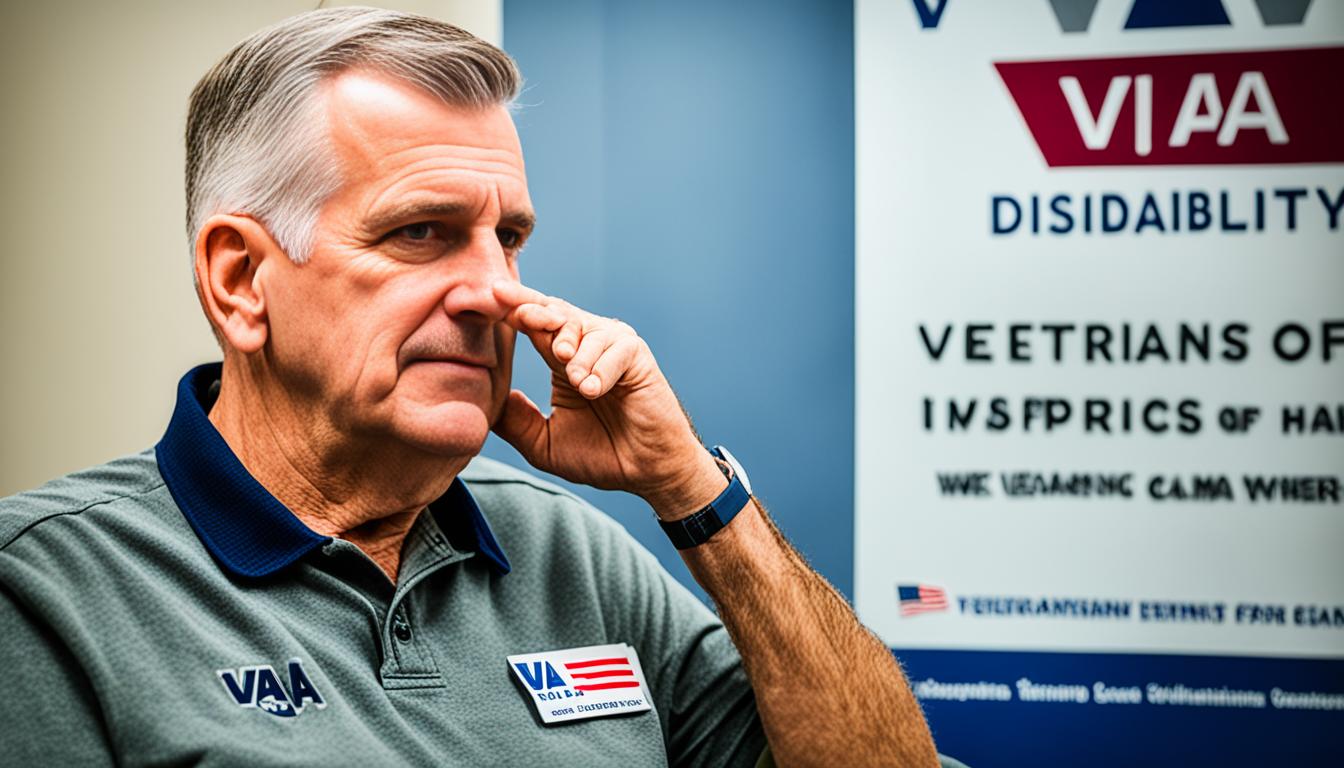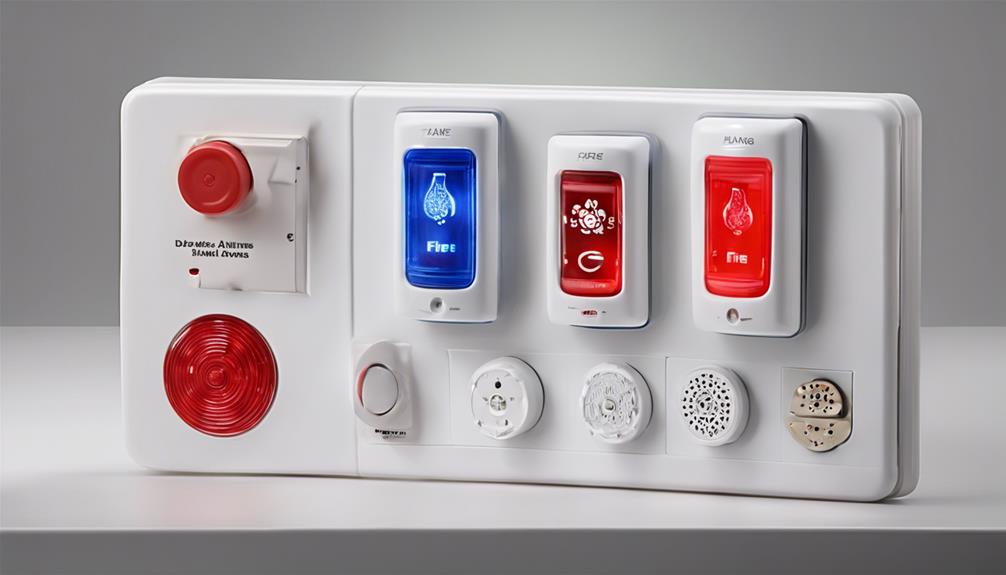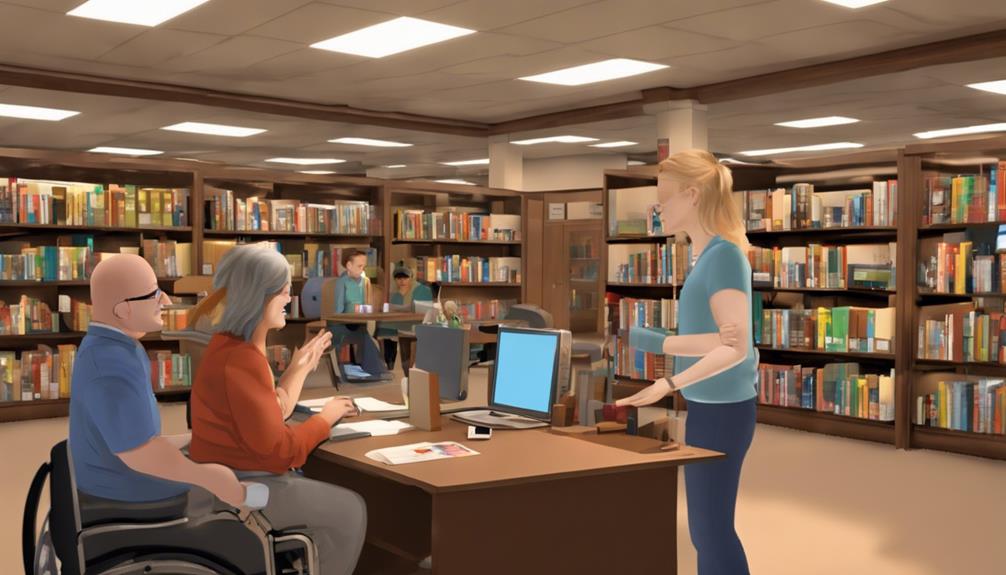Embarking upon the expansive sea, envision the soft rocking of the boat below us, the salt-laden wind caressing our cheeks, and the excitement of forthcoming journeys.
Navigating the world of cruising as a deaf traveler can present unique challenges and opportunities. From insider tips on selecting the most accommodating cruise ship to firsthand experiences shared by fellow deaf travelers, our journey into empowering deaf travelers in the realm of cruising promises invaluable insights and practical wisdom.
Let's uncover the hidden gems of cruising for the deaf community together.
Key Takeaways
- Prioritize cruise ships with accessibility features for Deaf travelers' comfort.
- Utilize sign language interpreters and communication aids for seamless interactions.
- Prepare for emergencies with visual alerts, safety devices, and communication plans.
- Engage in cultural sensitivity, staff training, and community support for enriched travel experiences.
Selecting the Right Cruise Ship
When looking for the perfect cruise ship, prioritize accessibility features that cater to the unique needs of deaf travelers. It's essential to research cruise ships that offer visual and tactile signaling systems in public areas to aid in navigation. These systems can significantly enhance the cruising experience by providing clear directions and information.
Additionally, consider selecting a cruise ship that provides cabin alert systems for notifications and alerts during the trip. These alert systems ensure that deaf travelers don't miss any important announcements or safety information while onboard.
Furthermore, when evaluating cruise itineraries, look for potential communication barriers and opt for experiences that use familiar language or focus on nature. Choosing cruises with nature-focused activities can enhance the overall enjoyment of the trip without relying heavily on verbal communication.
It's also advisable to select cruise lines that offer assistive listening devices and to request them before boarding to guarantee a seamless experience. Lastly, confirm your accessibility needs with the ship's accessibility coordinator and arrange for a sign language interpreter in advance to ensure effective communication throughout the journey.
Accessible Shore Excursions
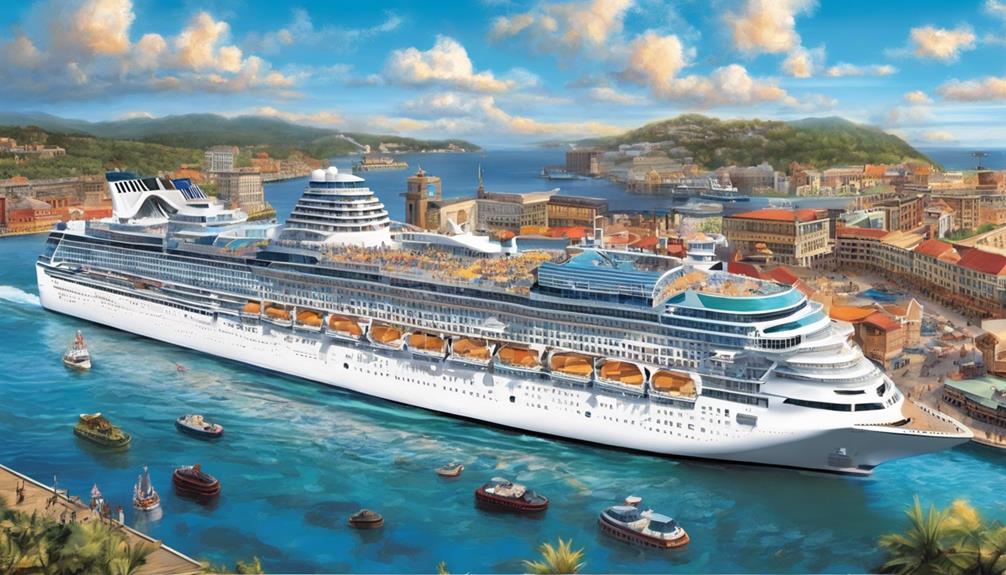
When considering accessible shore excursions for Deaf travelers, it's important to note the availability of sign language interpreters and visual aids that enhance the exploration of landmarks. These tailored experiences aim to make the journey inclusive and enriching for all passengers, ensuring equal access to the wonders of each destination.
Prior arrangements are key to securing specific accommodations, guaranteeing a smooth and enjoyable shore excursion for everyone.
Sign Language Interpreters
Accessible shore excursions featuring sign language interpreters significantly enhance the travel experiences of Deaf cruisers. These interpreters play a crucial role in ensuring clear communication during onshore activities, allowing Deaf travelers to fully engage in tours and interact with locals.
By providing cultural insights and facilitating conversations, sign language interpreters create a more inclusive and accessible environment for all participants. Their presence not only breaks down communication barriers but also promotes a deeper understanding of the destinations visited.
Deaf cruisers can immerse themselves in the sights and sounds of each port of call with confidence, knowing that they have the support needed to make the most of their travel experiences.
Visual Aids for Landmarks
Enhancing the exploration of landmarks during accessible shore excursions for Deaf travelers is achieved through the provision of visual aids that cater to diverse sensory needs. These aids include tactile maps, detailed descriptions, braille signage, tactile models, diagrams, and illustrations. By offering this multi-sensory experience, landmark tours ensure that Deaf participants can appreciate historical sites and architectural wonders fully. The inclusion of visual aids not only enhances understanding but also fosters a sense of inclusivity and innovation in accessible shore excursions. Deaf travelers can immerse themselves in the beauty of landmarks with the assistance of these thoughtful provisions, making their travel experiences more enriching and enjoyable.
| Visual Aids for Landmarks | Accessible Shore Excursions |
|---|---|
| Tactile maps | Detailed descriptions |
| Braille signage | Tactile models |
| Diagrams | Illustrations |
Sign Language Interpreters on Board
Ensuring a seamless experience on a cruise for deaf travelers may involve requesting a sign language interpreter in advance for effective communication onboard. Some cruise lines offer sign language interpreters upon request, but it's crucial to communicate this need beforehand.
While not all cruise lines explicitly mention this service on their websites, contacting accessibility coordinators can help arrange for a sign language interpreter. Clearly stating your requirement for a sign language interpreter is essential to guarantee a smooth experience during your cruise.
Communication Technologies Available

We understand the importance of accessible communication for deaf travelers. Sign language interpreters and text-to-speech devices are valuable tools that cruise lines provide to enhance communication options.
These technologies contribute to a more inclusive and enjoyable travel experience for all passengers.
Sign Language Interpreters
When requesting sign language interpreters for a cruise, travelers should notify the cruise line in advance to ensure a smooth communication experience. Here are some communication technologies available to empower Deaf travelers onboard:
- Assistive Listening Devices: Some cruise lines offer these devices to enhance communication.
- Closed Captioning: Enjoy shows and movies with accessible closed captioning options.
- Visual and Tactile Signaling Systems: These aids can assist Deaf travelers in navigating public areas on the ship.
- Amplified Telephones and Closed-Caption TV: Common onboard for additional communication needs.
Text-To-Speech Devices
For Deaf travelers seeking enhanced communication options onboard, Text-To-Speech Devices serve as valuable tools to convert written text into spoken words, facilitating effective interactions with fellow passengers and crew members. These devices help bridge the communication gap between Deaf individuals and non-signers, enhancing accessibility and inclusivity on cruises.
By utilizing text-to-speech technology, Deaf passengers can overcome communication barriers and engage in real-time conversations using apps on their smartphones. The availability of text-to-speech devices onboard ensures that Deaf travelers can fully participate in activities, access information, and enjoy their cruise experience to the fullest.
Embracing such innovative communication technologies empowers Deaf individuals to engage more confidently and independently while traveling.
Deaf-Friendly Entertainment Options
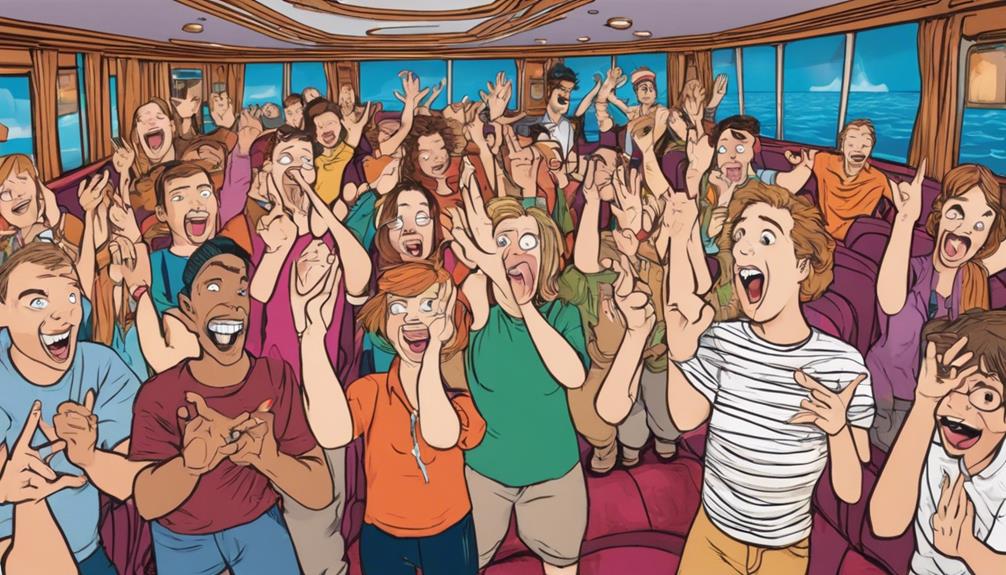
Entertainment options tailored for Deaf travelers onboard cruises encompass a range of inclusive features to enhance their experience. Here are some ways cruise lines cater to the Deaf community:
- Captioned Movies and Shows: Deaf passengers can enjoy movies, shows, and performances with captions to follow along effortlessly.
- Sign Language Interpreters: Some cruise lines provide sign language interpreters for live entertainment events, ensuring Deaf travelers can fully engage.
- Assistive Listening Systems: Accessible communication devices enhance entertainment experiences by offering clear sound directly to the individual.
- Visual Signaling Systems: Deaf travelers benefit from visual signaling systems for announcements and activities, keeping them informed throughout the journey.
These thoughtful additions not only make entertainment more enjoyable but also foster a sense of inclusivity and belonging for Deaf passengers on cruise vacations.
Safety and Emergency Preparedness
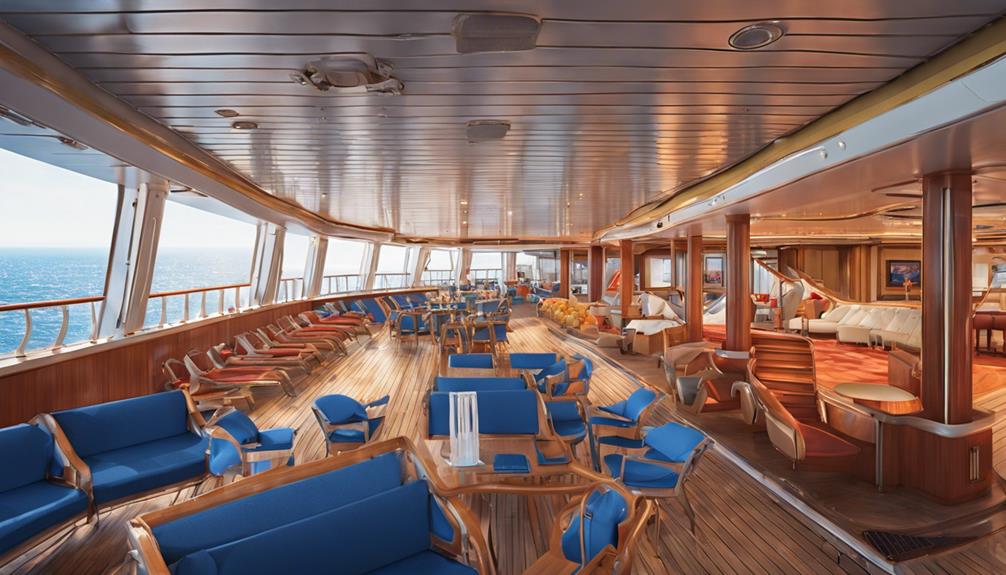
Ensuring our safety and preparedness during a cruise involves proactive measures and thoughtful planning. For deaf travelers, being prepared for emergencies is essential. Packing extra batteries for hearing devices is crucial to ensure they last throughout the trip. It's also important to have a written communication plan in case of device failures, allowing for effective communication to be maintained.
Visual smoke detectors and bed shakers can provide additional safety measures in case of emergencies, alerting deaf individuals effectively. Communication challenges may arise during emergencies onboard, so being prepared is key. Safety devices should be in place to assist during emergencies and maintain overall safety for all passengers, including those with hearing impairments.
Pre-Cruise Communication Needs
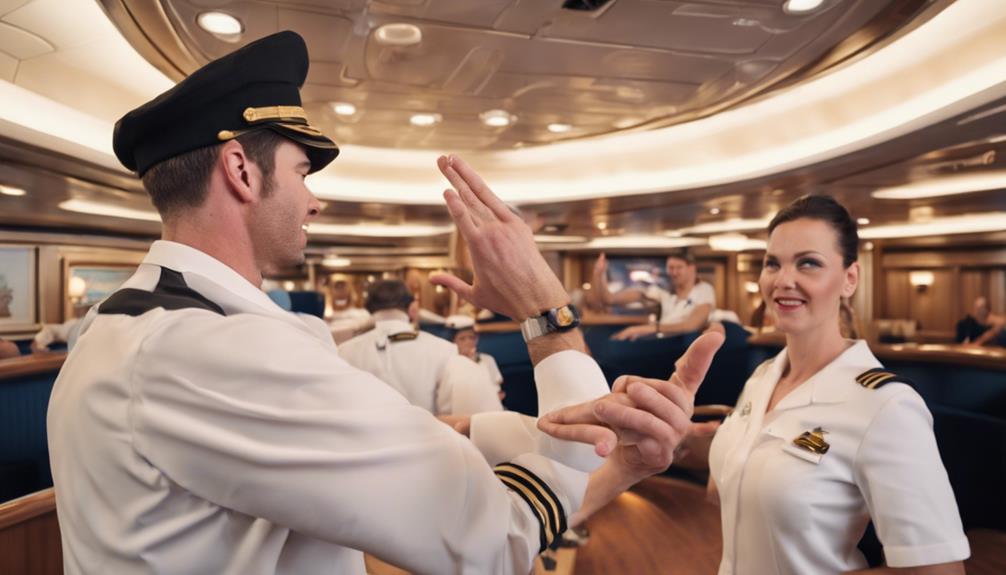
As Deaf travelers preparing for a cruise, understanding our communication preferences is crucial. We appreciate accessible booking options that allow us to convey our needs effectively.
Requesting sign language interpreters in advance ensures a smooth and enjoyable experience onboard.
Communication Preferences Survey
Understanding the communication preferences of Deaf travelers before their cruise is essential for creating a personalized and inclusive experience. To cater to their needs effectively, we conduct a Communication Preferences Survey to gather crucial information.
- Preferred Communication Methods: Identifying how Deaf travelers prefer to communicate ensures messages reach them clearly.
- Assistive Technology Requirements: Knowing if specialized devices are needed helps us provide necessary accommodations.
- Language Preferences: Understanding preferred languages allows for smoother interactions and information dissemination.
- Emergency Communication Plans: Establishing protocols for urgent situations ensures Deaf passengers receive timely and appropriate assistance.
Accessible Booking Options
For travelers with accessibility needs, exploring accessible booking options before a cruise can ensure a smooth and enjoyable experience tailored to individual requirements. When booking, remember to request assistive listening devices, sign language interpreters, and closed captioning for shows and movies to enhance your onboard experience.
Utilize special needs forms or accessibility coordinators to communicate your specific needs ahead of time. Additionally, advocate for enhancements and request tailored services without hesitation to guarantee a comfortable journey.
Clear communication is key, so make use of visual aids and written information onboard to assist in understanding announcements and activities. By being proactive and thorough in your pre-cruise communication, you can set yourself up for a stress-free and fulfilling trip. Remember these travel tips for a seamless adventure at sea.
Sign Language Interpreters
When arranging pre-cruise communication needs, ensure to request sign language interpreters in advance to guarantee communication accessibility throughout your journey.
- Plan Ahead: Request sign language interpreters early to secure their availability.
- Check Cruise Line Policies: Some cruise lines may not clearly state their provisions for sign language interpreters, so confirm this in advance.
- Communicate Clearly: Provide clear guidelines for requesting and confirming sign language interpreters with accessibility coordinators to avoid any miscommunication.
- Confirm Availability: Not all cruise lines offer explicit accommodations for Deaf passengers needing sign language interpreters, so make sure to confirm their availability before boarding for a smoother experience.
Cultural Sensitivity Awareness
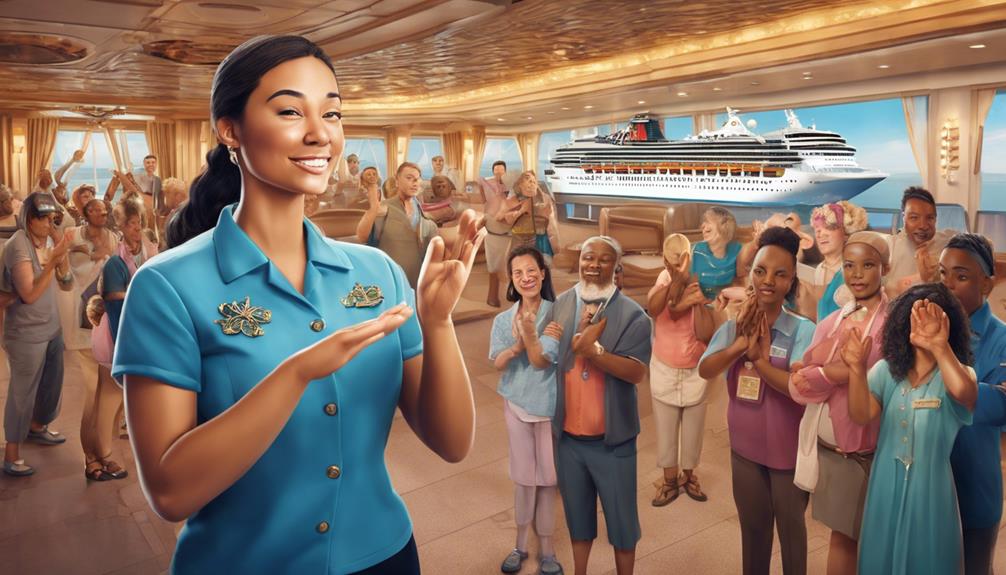
In our interactions with others, embracing cultural sensitivity awareness allows us to connect authentically and respectfully across diverse backgrounds.
When considering Deaf people, cultural sensitivity becomes even more crucial. Understanding and respecting different cultural norms, values, and practices within the Deaf community is essential for fostering positive relationships and creating inclusive environments.
This involves recognizing and appreciating the diversity in languages, traditions, and beliefs that exist among Deaf individuals.
Deaf Community Networking Opportunities

Participating in Deaf community networking opportunities enriches our travel experiences by fostering connections and promoting cultural exchange among like-minded individuals. Here are four key benefits of engaging in Deaf community networking:
- Shared Experiences: Networking events provide a platform for Deaf travelers to share their unique travel experiences, tips, and recommendations, creating a supportive environment for mutual learning and growth.
- Cultural Exchange: By connecting with fellow Deaf individuals, we've the opportunity to exchange cultural insights, traditions, and perspectives, enriching our understanding of different communities around the world.
- Supportive Environment: Deaf-focused networking events create a safe and inclusive space for Deaf travelers to interact, engage, and socialize, fostering a sense of community and belonging while on the go.
- Building Connections: Engaging in networking opportunities allows us to build lasting relationships with like-minded individuals, paving the way for future collaborations, friendships, and shared adventures within the Deaf community.
Staff Training and Awareness Programs
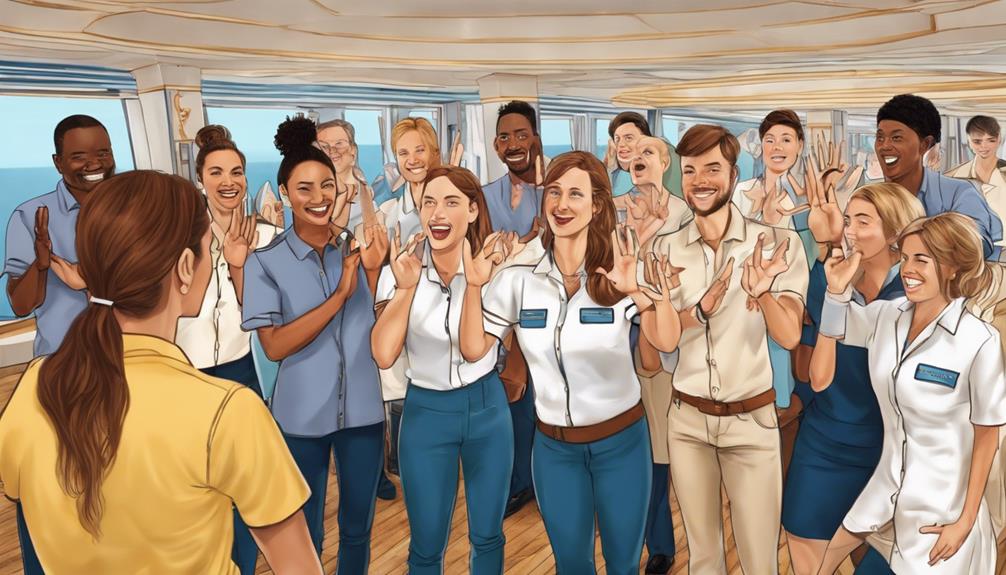
Engaging with staff training and awareness programs is crucial for ensuring a positive and accommodating experience for Deaf travelers aboard cruises. Staff training programs focus on enhancing awareness about Deaf travelers' needs and communication preferences. These programs include education on sign language basics, Deaf culture, and common communication barriers. The emphasis is on patient and clear communication to guarantee a favorable experience for Deaf passengers. Staff members are trained to use visual aids, gestures, and written communication effectively to assist Deaf travelers. Ongoing training sessions play a vital role in helping staff understand the diverse needs of Deaf passengers and provide tailored support onboard.
| Key Points | Details | Importance |
|---|---|---|
| Sign Language Basics | Educates staff on fundamental sign language skills | Enhances communication with Deaf guests |
| Deaf Culture Awareness | Teaches about Deaf culture and communication norms | Promotes cultural sensitivity |
| Communication Strategies | Trains staff on using visual aids and gestures | Ensures effective communication methods |
| Tailored Support | Provides ongoing training for diverse passenger needs | Delivers personalized assistance |
Accessibility of Onboard Facilities
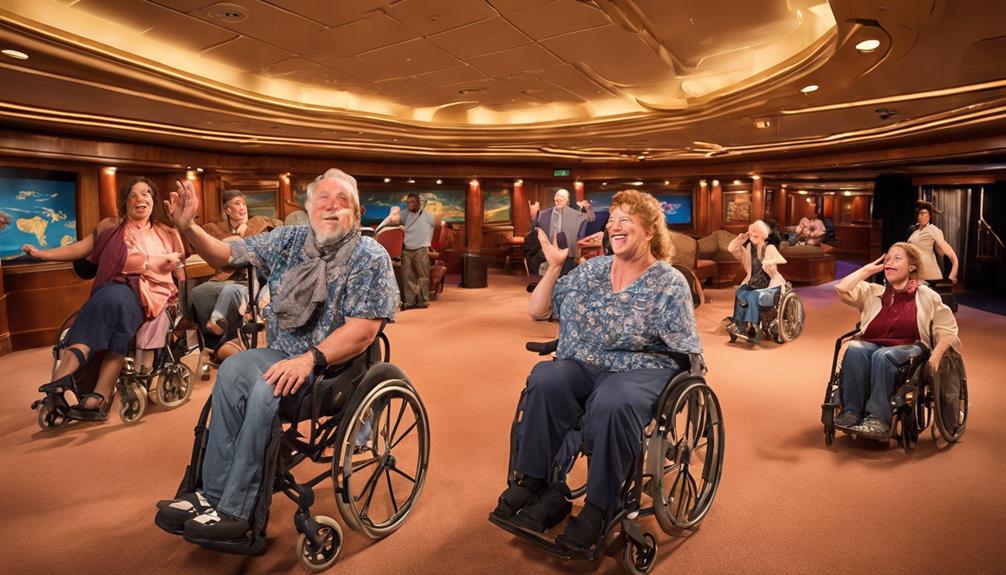
Understanding the importance of accessibility on cruise ships is key to ensuring a comfortable and inclusive experience for all passengers, including those with varying abilities. When it comes to accessibility for Deaf travelers, cruise lines have implemented various features to enhance their onboard experience:
- Closed Captioning: Cruise lines offer closed captioning on select television channels, allowing Deaf travelers to enjoy entertainment options.
- Visual Alerts: Staterooms are equipped with visual alerts to notify individuals with hearing impairments of important announcements or alarms.
- Texting Apps: Many cruise ships provide a ship-wide texting app as an alternative to TTYs, facilitating seamless communication for Deaf passengers.
- Braille Signage: To aid visually impaired passengers in navigation, cruise ships have incorporated Braille signage around the ship, ensuring they can move around independently.
Deaf Traveler Testimonials
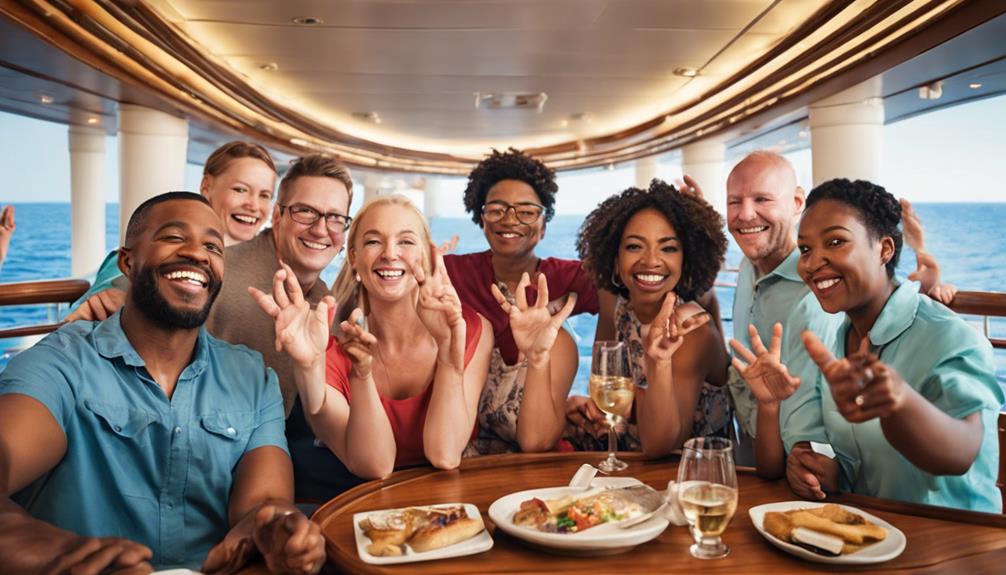
As we explore Deaf Traveler Testimonials, we encounter uplifting narratives of triumph over communication barriers and the celebration of diverse global cultures. These stories not only highlight the importance of self-advocacy and empowerment but also shed light on effective communication strategies used onboard.
Through these testimonials, the spotlight shines on the accessibility accommodations that play a crucial role in enhancing the travel experiences of Deaf individuals.
Positive Deaf Travel Stories
Embarking on our global adventures as Deaf travelers, we immerse ourselves in vibrant cultures, forging connections, and sharing powerful experiences within diverse Deaf communities worldwide. Through our journeys, we defy limitations and inspire others to explore the world with confidence.
- Discovering Unity: Deaf travelers find common ground in shared experiences, creating a sense of unity that transcends borders.
- Cultural Exchange: Embracing new cultures enriches our understanding of the world and fosters mutual respect among Deaf and hearing communities.
- Inspiring Awareness: Filming our stories while backpacking in Asia and Latin America raises awareness about Deaf culture and promotes inclusivity.
- Resilience and Passion: Despite challenges and discrimination, Deaf travelers remain resilient and passionate about breaking barriers and expanding horizons.
Communication Strategies Onboard
When cruising, Deaf travelers stress the critical need for clear communication strategies to enhance their onboard experience. Utilizing assistive devices like closed captioning and amplification systems is key to ensuring Deaf passengers fully enjoy their time at sea.
Access to sign language interpreters and communication aids on cruise ships is crucial for effective interaction with staff and fellow travelers. Deaf traveler testimonials highlight the importance of proactive communication with ship personnel to address accessibility needs promptly.
Understanding communication barriers and advocating for inclusive services onboard are essential aspects of empowering Deaf travelers to have a seamless and enjoyable cruise experience. By prioritizing effective communication strategies, cruise lines can create a more inclusive and welcoming environment for Deaf passengers.
Accessibility Accommodations Highlighted
Deaf travelers have emphasized the importance of accessibility accommodations through their insightful testimonials, shedding light on the impactful enhancements these services bring to their cruise experiences. When cruise lines cater to the needs of Deaf and hard-of-hearing passengers, it creates a more inclusive and enjoyable journey for all.
Here are some key accommodations highlighted by Deaf travelers:
- Requesting assistive listening devices, sign language interpreters, and closed captioning for shows and movies.
- Utilizing visual and tactile signaling systems, cabin alert systems, and amplified telephones for communication accessibility.
- Communicating needs to ship staff, accessibility coordinators, and travel agents for enhanced accommodations.
- Receiving assistance in challenging areas, finding suitable seating, ship orientation tours, and special communication services.
Legal Rights and Protections
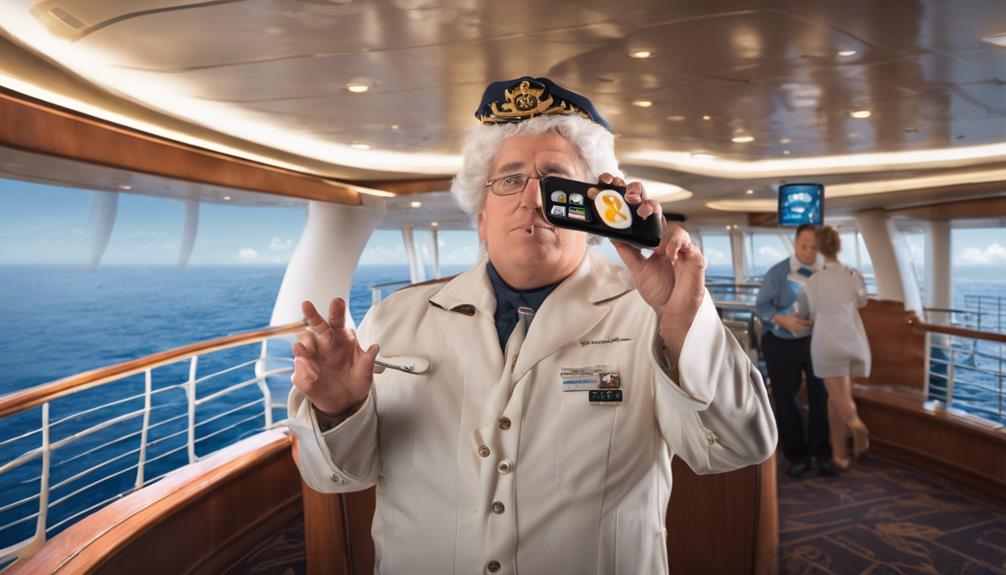
Ensuring legal rights and protections for Deaf travelers within the cruise industry is essential for fostering inclusivity and accessibility. The National Association of the Deaf has already voiced concerns about the lack of accessibility in this sector. While most cruise lines offer in-room ADA kits for guests with disabilities, there's a lack of transparency regarding provisions for sign language interpreters on many cruise line websites. It's crucial for Deaf travelers to request accommodations, including sign language interpreters, in advance to guarantee a seamless experience.
However, it's concerning that explicit accommodations for DeafBlind passengers aren't mentioned on cruise line websites. To address this gap, advocating for clearer policies and communication regarding accommodations for DeafBlind individuals is paramount. By pushing for increased transparency and adherence to legal rights, we can work towards creating a more inclusive and welcoming environment for all Deaf travelers within the cruise industry.
Tips for Booking Accommodations
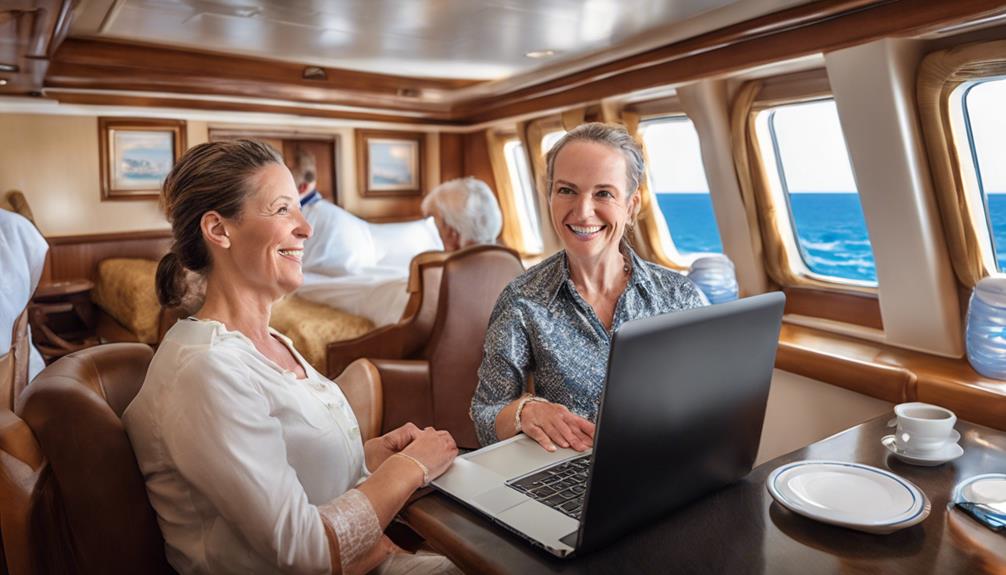
To ensure a smooth and accommodating experience when booking accommodations for a cruise, it's essential to thoroughly research the accessibility features available on different cruise ships. When planning a trip as a deaf person, consider the following tips:
- Look for Visual and Tactile Signaling Systems: Research cruise ships that offer visual and tactile signaling systems in cabins to alert you of important announcements or emergencies.
- Request Assistive Listening Devices: Ensure you request assistive listening devices and cabin alert systems before boarding to enhance your communication and safety on the ship.
- Confirm Closed Captioning Availability: Prioritize cruise ships that provide closed captioning for shows, movies, and amplified telephones to make entertainment more accessible.
- Communicate Your Accommodation Needs: Reach out to the accessibility coordinator or fill out special needs forms to communicate your specific accommodation requirements effectively.
Frequently Asked Questions
What Are Some Leisure Activities for Deaf People?
We enjoy a variety of leisure activities like hiking, swimming, visiting museums, and playing sports. Exploring cuisines, engaging in outdoor adventures, and taking part in cultural experiences are all popular among us.
These activities bring us joy, connection, and a chance to explore the world around us. Each experience is unique and adds to our rich tapestry of life.
What Are the Entertainment Options for Deaf People?
Entertainment options for Deaf individuals vary widely, from captioned shows and movies to sign language interpreters at live performances. Interactive games with visual cues and inclusive activities like dance parties and comedy shows provide engaging experiences. Accessible touch tours offer unique ways to interact with entertainment venues.
Deaf travelers can enjoy a range of activities, ensuring a fun and inclusive experience on cruises and beyond.
How Do Deaf People Travel?
We travel by exploring new destinations, embracing diverse cultures, and connecting with people worldwide.
Overcoming barriers, we navigate through different languages and customs to pursue our dreams.
By saving money and meeting fellow Deaf travelers, we embark on adventures across the globe, from Asia to Latin America.
Despite challenges, we remain passionate about exploring the world, breaking down limitations to create unforgettable experiences.
How Do You Accommodate Deaf People?
Accommodating Deaf individuals involves providing assistive devices, visual signaling systems, and accessibility coordinators for tailored assistance.
Cruise lines extend services like closed captioning, sign language interpreters, and ADA kits to ensure a comfortable experience.
Empathy and innovation drive our commitment to inclusivity, fostering a welcoming environment for all passengers.
We strive to empower Deaf travelers by offering comprehensive communication solutions for a seamless journey at sea.
Conclusion
As deaf travelers, we've learned to navigate the seas with confidence and grace, advocating for our needs and embracing new experiences. Despite the challenges we face, we've discovered a world of possibilities on cruise ships that cater to our unique communication needs.
So, next time you set sail, remember to pack your self-advocacy skills and sense of adventure – you never know what unexpected delights may await you on the high seas.


